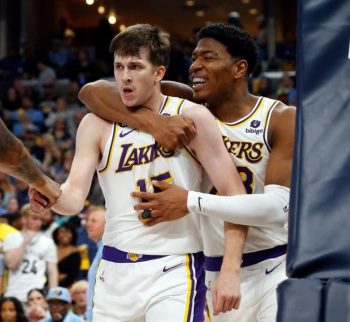NBA
Will Kyle Lowry Take the Next Step?

As the summer gives way to the fall and the final set of pieces fall into place for some of the NBA’s contenders and late free agents, Rajon Rondo will eventually emerge as the most talked about point guard in the Atlantic Division.
But it is Kyle Lowry who holds the keys to whether the Toronto Raptors will eventually rise up as its eventual champion.
After putting together the best season of his career, with DeMar DeRozan and Jonas Valanciunas showing signs of progression, Lowry helped to lead the Raptors to their second division title in franchise history and was rewarded with a four-year, $48 million contract from general manager Masai Ujiri.
Now, in a career that has been marked by inconsistency, attrition and miscellaneous ups and downs, it is on Lowry to prove Ujiri made a wise investment in him. It is not uncommon for players to put together career-best years at convenient times in order to help assure themselves big paydays. Getting googly-eyed over the “contract-year-guy” is a general manager’s worst fear.
Last season, Lowry was good for 17.9 points, 4.7 rebounds and 7.4 assists per night—a substantial jump from the 11.7 points, 3.8 rebounds and 5.4 assists he has averaged over the course of his eight-year career.
It’s too early to know which, but by trading for and subsequently re-signing Lowry, the Raptors either pulled off a major heist at the expense of the Houston Rockets—the team from which they acquired Lowry—or a huge mistake in making a hefty financial commitment to him.
Over the course of the past two collective bargaining agreements, the sting of making a mistake has been lessened by shorter contract lengths. Rather than being stuck with a sunk cost for seven years (as was once the case), a “mistake” must now be lived with for a mere four, in most cases.
Awarding a big payday with a limited sample size is a tough call to make. Many years ago, when Danny Ainge saw potential in Rondo and signed him to a five-year extension worth $55 million, quite a few thought that Rondo was given too rich of a contract. Since then, he has proven himself to be worth it, and then some.
Now, it is Lowry’s turn to prove, one way or another.
With the Celtics expected to continue on a rebuilding project that’s next step is expected to be marked by an eventual Rondo trade and the Philadelphia 76ers patiently awaiting Nerlens Noel to shake off his rust and Joel Embiid to return from foot surgery, the Raptors will enter the 2014-15 season as the favorite to win the NBA’s Atlantic Division title. Both the New York Knicks and Brooklyn Nets should have an opportunity to, at least, compete, but Lowry will ultimately determine which team wins the right to represent the Eastern Conference in the playoffs as a top-four seed.
An underplayed part of the story behind Lowry’s thriving last season was his connecting with Ujiri and being challenged by the general manager to fulfill the expectations that followed Lowry from Villanova into the NBA after he was selected with the 24th pick of the 2006 NBA Draft.
As a result, Lowry, under the guise that Ujiri would be prepared to heavily invest in him as the team’s point guard, did everything that was hoped of and expected from him. He managed to stay healthy after missing 59 total games over the course of the previous two seasons, he managed to trim down and remain svelte for the balance of the season. On the floor, he raised eyebrows with his ability to hit big shots and make the correct decisions when big games were hanging in the balance.
After being dangled to the Knicks for what seemed to be the entire duration of the period immediately proceeding Christmas Day until the trade deadline passed in late February, Lowry put together an all-around solid performance in the 2014 playoffs, even if the Raptors were eventually ousted by the Nets in a seven-game first round playoff series.
Whether it was all a dream—all just a convenient aberration for a player looking to get paid—is what Lowry will have the opportunity to prove.
Along with the likes of John Wall and Jeff Teague, Lowry is one of the point guards in the Eastern Conference entering this season with the most weight on his shoulders.
Finally, it seems, he has found a home in the NBA.
In terms of win-loss record, with the improved Eastern Conference, it may be difficult for the Raptors to eclipse last season’s 48-win mark, but with continuity, natural progression and the underrated acquisition of Lou Williams, the also re-signed Dwane Casey should have every expectation of his team repeating as division champions. Whether or not that actually transpires will be determined by whether the productivity of Lowry and his 2013-14 season was lightning in a bottle, or if is the new norm for a young point guard who has emerged and has come into his own.
It seems like such a long time ago that Lowry was acquired by the Raptors back in July 2012. Back then, the Houston Rockets opted to deal him North of the Border for a first-round draft pick in the 2013 draft (which later became Steven Adams) and journeyman Gary Forbes.
With certain All-Star potential and a huge payday, Lowry’s new lease on life in the NBA is set to begin.
In Toronto, with expectations brought forth by a division title and $48 million, one way or another, the NBA public will learn a thing or two about not only Masai Ujiri and his Toronto Raptors, but also about what drove Lowry last season and whether he is capable of driving the Raptors to a place the franchise has not known for quite some time—consistent relevancy in an increasingly competitive Eastern Conference.














